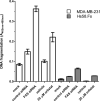Synthesis of novel beta-lactone inhibitors of fatty acid synthase
- PMID: 18710210
- PMCID: PMC3172131
- DOI: 10.1021/jm800321h
Synthesis of novel beta-lactone inhibitors of fatty acid synthase
Abstract
Fatty acid synthase (FAS) is necessary for growth and survival of tumor cells and is a promising drug target for oncology. Here, we report on the syntheses and activity of novel inhibitors of the thioesterase domain of FAS. Using the structure of orlistat as a starting point, which contains a beta-lactone as the central pharmacophore, 28 novel congeners were synthesized and examined. Structural features such as the length of the alpha- and beta-alkyl chains, their chemical composition, and amino ester substitutions were altered and the resulting compounds explored for inhibitory activity toward the thioesterase domain of FAS. Nineteen congeners show improved potency for FAS in biochemical assays relative to orlistat. Three of that subset, including the natural product valilactone, also display an increased potency in inducing tumor cell death and improved solubility compared to orlistat. These findings support the idea that an orlistat congener can be optimized for use in a preclinical drug design and for clinical drug development.
Figures








Similar articles
-
A strategy for dual inhibition of the proteasome and fatty acid synthase with belactosin C-orlistat hybrids.Bioorg Med Chem. 2017 Jun 1;25(11):2901-2916. doi: 10.1016/j.bmc.2017.01.020. Epub 2017 Jan 19. Bioorg Med Chem. 2017. PMID: 28236510 Free PMC article.
-
Beta-lactam congeners of orlistat as inhibitors of fatty acid synthase.Bioorg Med Chem Lett. 2008 Apr 1;18(7):2491-4. doi: 10.1016/j.bmcl.2008.02.043. Epub 2008 Feb 19. Bioorg Med Chem Lett. 2008. PMID: 18343106
-
Total synthesis and comparative analysis of orlistat, valilactone, and a transposed orlistat derivative: Inhibitors of fatty acid synthase.Org Lett. 2006 Sep 28;8(20):4497-500. doi: 10.1021/ol061651o. Org Lett. 2006. PMID: 16986934
-
Pharmacological inhibitors of Fatty Acid Synthase (FASN)--catalyzed endogenous fatty acid biogenesis: a new family of anti-cancer agents?Curr Pharm Biotechnol. 2006 Dec;7(6):483-93. doi: 10.2174/138920106779116928. Curr Pharm Biotechnol. 2006. PMID: 17168665 Review.
-
Fatty acid synthase inhibitors: new directions for oncology.Expert Opin Investig Drugs. 2007 Nov;16(11):1817-29. doi: 10.1517/13543784.16.11.1817. Expert Opin Investig Drugs. 2007. PMID: 17970640 Review.
Cited by
-
Fatty acid synthase as a potential therapeutic target in cancer.Future Oncol. 2010 Apr;6(4):551-62. doi: 10.2217/fon.10.11. Future Oncol. 2010. PMID: 20373869 Free PMC article. Review.
-
Stereochemical Structure Activity Relationship Studies (S-SAR) of Tetrahydrolipstatin.ACS Med Chem Lett. 2018 Feb 21;9(3):274-278. doi: 10.1021/acsmedchemlett.8b00050. eCollection 2018 Mar 8. ACS Med Chem Lett. 2018. PMID: 29541373 Free PMC article.
-
Total synthesis of tetrahydrolipstatin and stereoisomers via a highly regio- and diastereoselective carbonylation of epoxyhomoallylic alcohols.J Am Chem Soc. 2014 Jul 30;136(30):10814-20. doi: 10.1021/ja505639u. Epub 2014 Jul 18. J Am Chem Soc. 2014. PMID: 25004122 Free PMC article.
-
Identification of New Modulators and Inhibitors of Palmitoyl-Protein Thioesterase 1 for CLN1 Batten Disease and Cancer.ACS Omega. 2024 Feb 28;9(10):11870-11882. doi: 10.1021/acsomega.3c09607. eCollection 2024 Mar 12. ACS Omega. 2024. PMID: 38496939 Free PMC article.
-
Ligand-Controlled Palladium-Catalyzed Carbonylation of Alkynols: Highly Selective Synthesis of α-Methylene-β-Lactones.Angew Chem Int Ed Engl. 2020 Nov 23;59(48):21585-21590. doi: 10.1002/anie.202006550. Epub 2020 Sep 17. Angew Chem Int Ed Engl. 2020. PMID: 32573055 Free PMC article.
References
-
- Alo PL, Visca P, Marci A, Mangoni A, Botti C, Di Tondo U. Expression of fatty acid synthase (FAS) as a predictor of recurrence in stage I breast carcinoma patients. Cancer. 1996;77:474–482. - PubMed
-
- Nakamura I, Kimijima I, Zhang GJ, Onogi H, Endo Y, Suzuki S, Tuchiya A, Takenoshita S, Kusakabe T, Suzuki T. Fatty acid synthase expression in Japanese breast carcinoma patients. Int. J. Mol. Med. 1999;4:381–387. - PubMed
-
- Wang YY, Kuhajda FP, Li J, Finch TT, Cheng P, Koh C, Li T, Sokoll LJ, Chan DW. Fatty acid synthase as a tumor marker: Its extracellular expression in human breast cancer. J. Exp. Ther. Oncol. 2004;4:101–110. - PubMed
-
- Swinnen JV, Roskams T, Joniau S, Van Poppel H, Oyen R, Baert L, Heyns W, Verhoeven G. Overexpression of fatty acid synthase is an early and common event in the development of prostate cancer. Int. J. Cancer. 2002;98:19–22. - PubMed
-
- Rossi S, Graner E, Febbo P, Weinstein L, Bhattacharya N, Onody T, Bubley G, Balk S, Loda M. Fatty acid synthase expression defines distinct molecular signatures in prostate cancer. Mol. Cancer. Res. 2003;1:707–715. - PubMed
Publication types
MeSH terms
Substances
Grants and funding
LinkOut - more resources
Full Text Sources
Other Literature Sources
Chemical Information
Molecular Biology Databases
Research Materials
Miscellaneous

